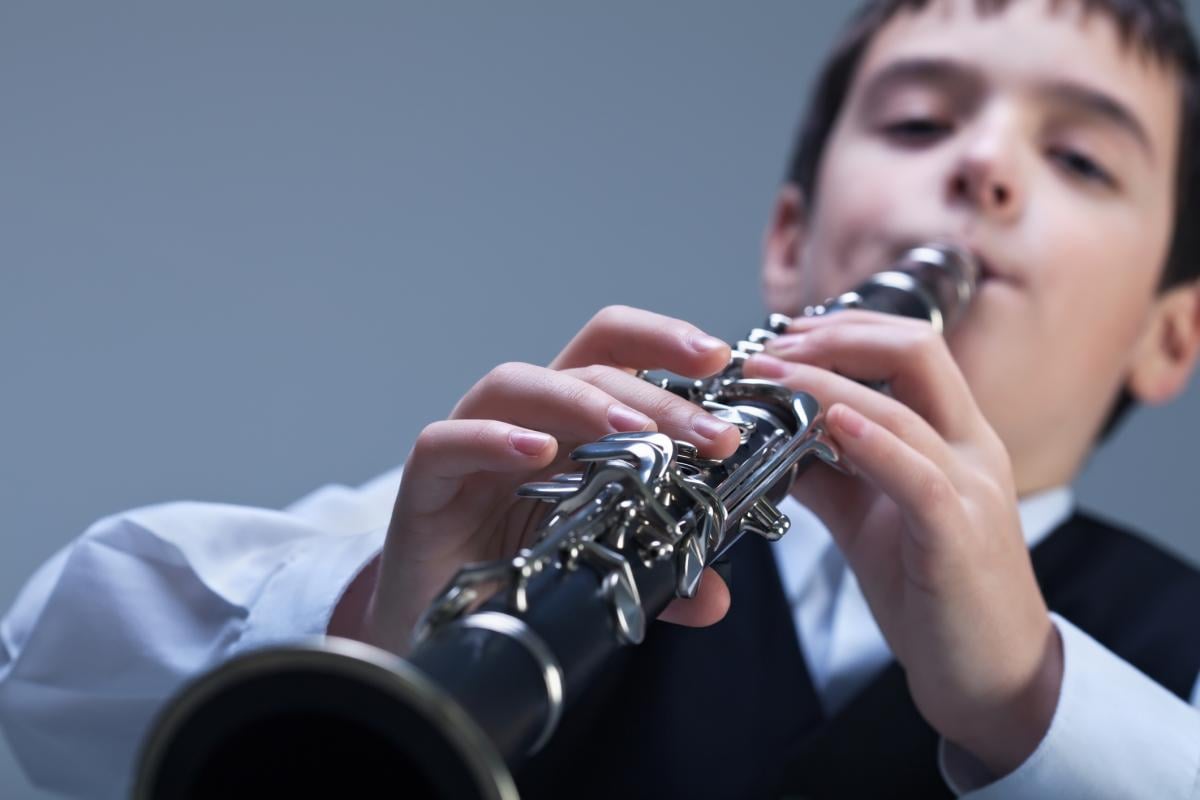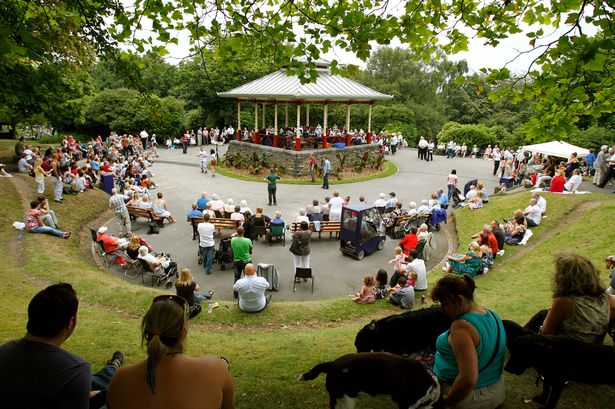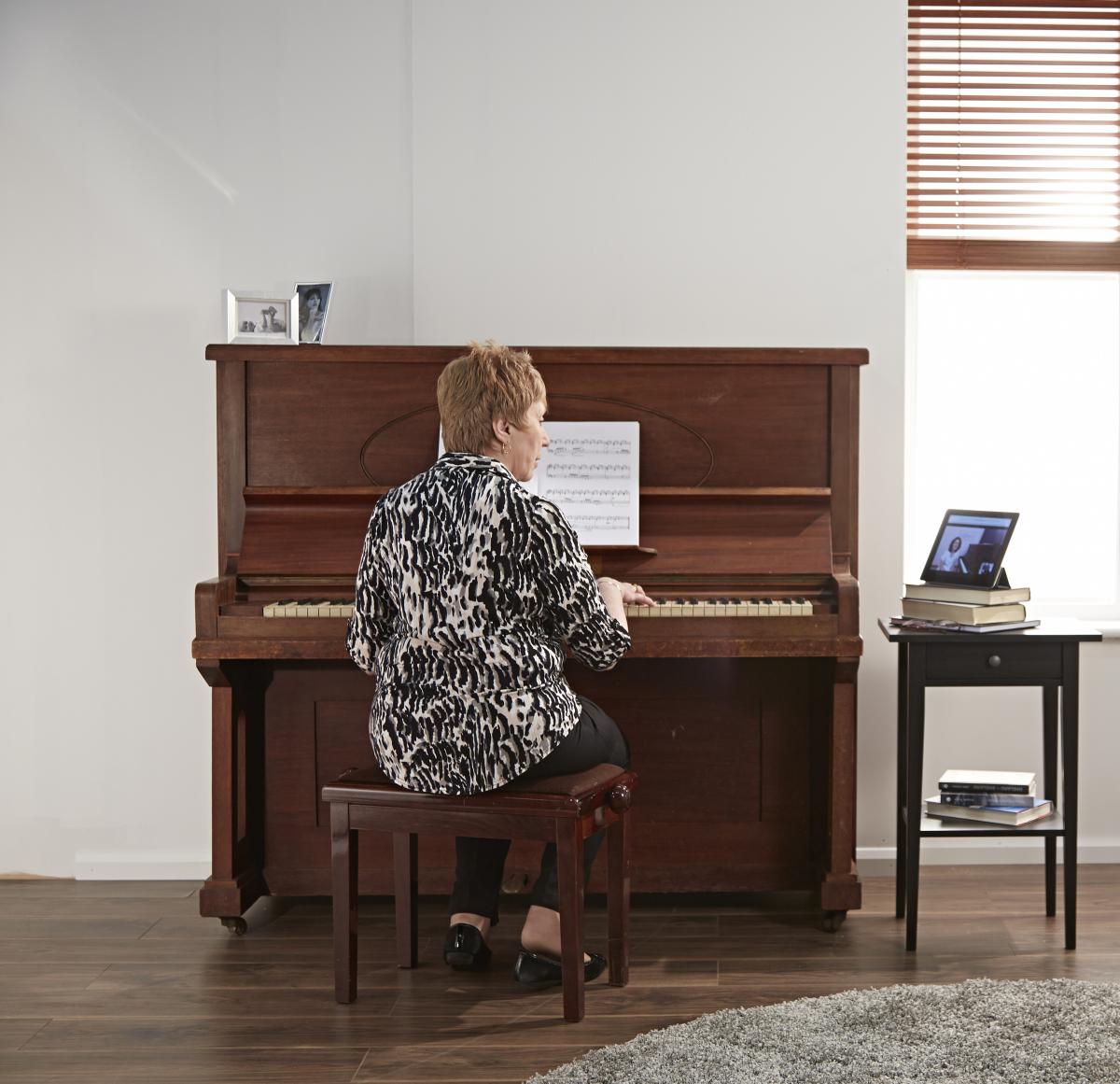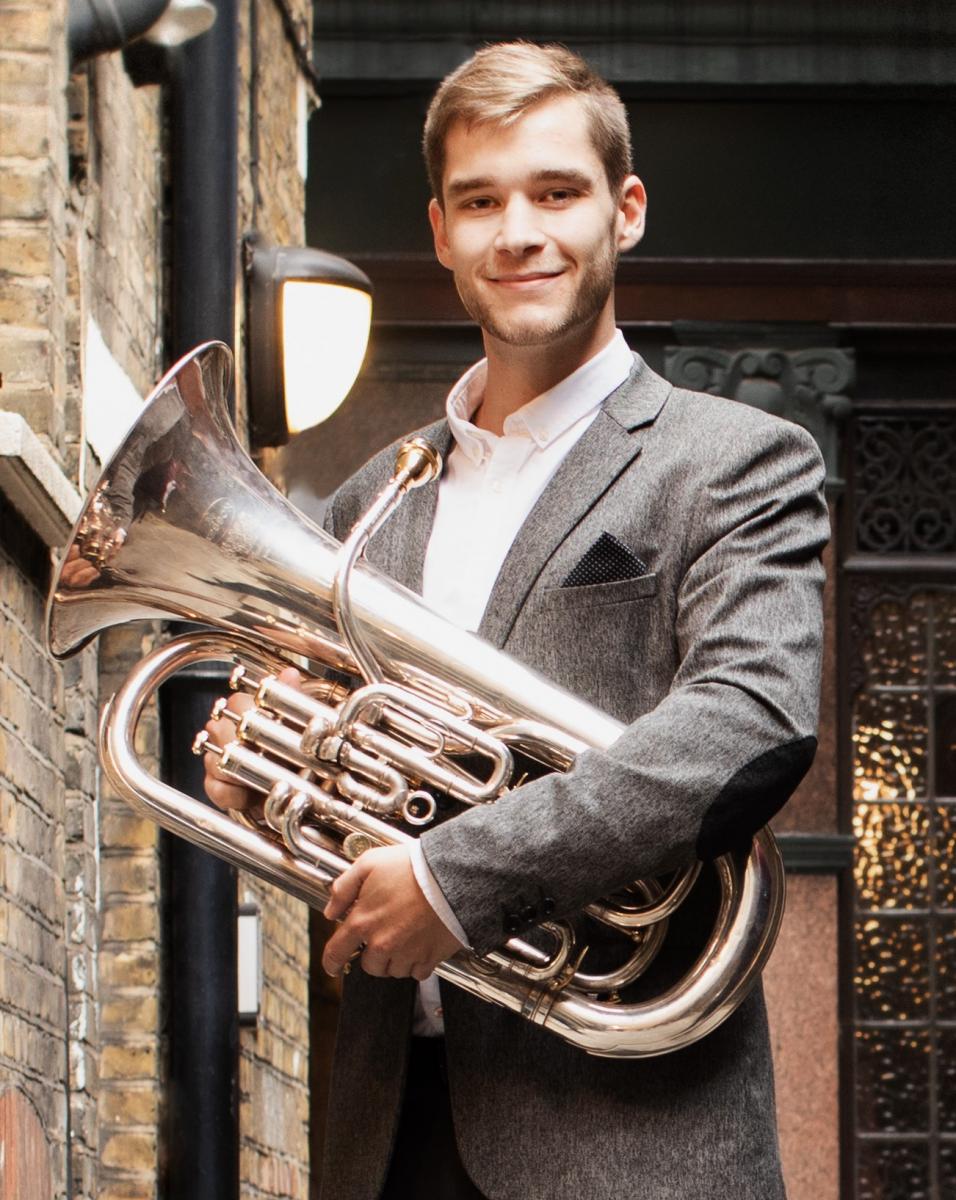
In this digital age the opportunities to learn to play the piano have been revolutionised, and the search for a piano teacher doesn’t always lead where you would expect.
Adult pupil, Jean said ‘I wanted to find some person to person piano lessons. But I couldn’t find one that was within my time frame after work and for certain dates I wanted. I didn’t want to travel too far and often I’m exhausted after working in the centre of London.’ In Jean’s case she was taking a term time group piano class with 11 other pianists in the building she works in but felt she would lose momentum during the summer break and wanted a solution to supplement her learning. Jean was open minded about trying new things and thought she would give live online piano lessons a go and booked her first three lessons to explore the opportunity.
Similarly, adult piano learner, James Williams found the time saving of learning at home an attractive feature after spotting an article about using Broadband for connecting and learning a musical instrument. ‘I finish work at 5.30pm and I can start my lesson at 5.30pm. Who else can say that?’ and his online piano teacher, Alex Chisholm Loxley sees the advantage for pupils like James, ‘when he’s got small children around and other stuff going on, he can just take half an hour out of the day to have a lesson and it keeps it all easy.’ And connecting virtually to a piano teacher outside of London was also a significant factor for James, ‘I think if I were to pursue this with the prices I have seen in my local area I may have not been able to keep up with it at London prices, £35 for a 30 minute lesson.’
8 year old Abi Johnston had a more stark choice when it came to a piano opportunity says her mum Lucie. When Abi’s ‘face-to-face’ teacher became unwell it became apparent what a barrier distance can be. ‘We live in the middle of nowhere. When we looked to get a new teacher the closest one was a 50 minute drive. So Abi would have had to stop or do online lessons. It’s been brilliant.’ Abi has gone on to pass an ABRSM music exam at her most local centre and really enjoys her online lessons, she says ‘I quite like how you don’t feel like there is someone watching you and judging you, like it can feel in face to face lessons.’
James’ passion for the piano and his regular contact with Alex has given him the skills to enter for ABRSM Grade 1 and 2 piano exams too, passing both with distinction, and he has a real vision to reach grade 8, although he does worry about learning online at that level ‘You worry that the quality would come across over to Alex. Can he hear my dynamics as much as I can hear them?’

This is an issue advanced online piano teacher, Mark Stawman, gets asked about a lot, ‘if pupils know the notes and you’re really working on the interpretation, the subtleties, the tone and the balance it’s worth investing in a good external microphone at grade 7 and 8’. USB Microphones can be purchased at £50 – 60 mark and used together with Skype or Zoom to enable the teacher to work at advanced level, but otherwise everyday laptop / tablet devices are generally fine for beginner and intermediate level players. Both Mark and Alex feel that online piano lessons have been ‘on trial’ but that everything that needs to be achieved can be done, so it’s been a massive game changer at all levels for people who can’t get to piano lessons, ‘Sharon’s grade 8 distinction was the moment of validation for me. We’re clearly not fooling ourselves that this works.’ says Alex.
So how do online piano teachers meet a high teaching quality benchmark?
When it comes to things likes posture and fingering on the piano, the camera angle on the pupil becomes vitally important ‘you can frame the camera so you ensure you can advise on posture and hand position, and for the beginners a laptop with everyday broadband can be all that’s needed. Plus, all our teachers have a professional microphone and camera set up’ says Olwen Macleod, Teaching Director at Your Space Music Lessons, who specialises in teaching the piano online to beginner adults and children. ‘Everything is taken step by step as if the teacher is sat next to you. And we build positive motivating relationships to develop confidence in all our music students.’
The flow and focus of online piano lessons is an advantage thinks Mark ‘If I explain a passage I can demonstrate it quicker than if I have students in the room otherwise I have to say 'move out of the way’. You have to be really good at communicating, but I think that makes you a better teacher.’
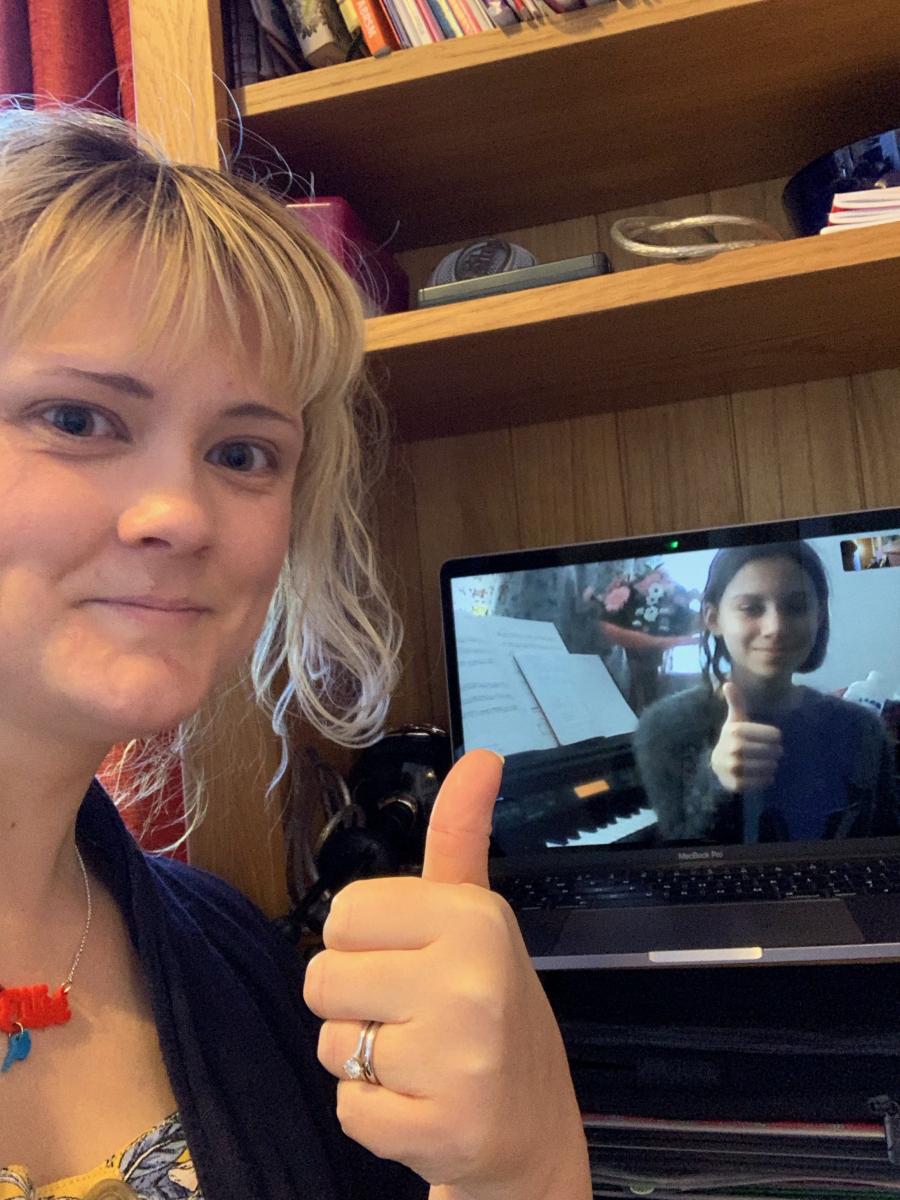
Music teaching academics are increasingly reflecting on the activities of online music schools, ‘as a piano teacher at the Royal Conservatoire of Scotland in Glasgow I have always been cautiously interested in the idea of online teaching but perhaps giving more thought to the potential problems rather than the potential advantages. Clearly the lessons are having a beneficial impact on the learners, both children and adults, and they are also without doubt enjoying their teachers’ 1 to 1 lessons with a similar ease of communication and enjoyment as they would have in ‘real’ life. My main concern has always been about sound quality and this is where our new digital age shines brightly and is a major factor in it’s recent success.’ says Isobel Anderson, Lecturer at RCS.
There’s still some way to changing the perception of online learning for something so personal and practical, as Jean says ‘Yeah people do think it’s strange. I think it’s the concept of it. It’s like how? how?’ and Online piano pupil Sophie Durrant still remembers chatting to other students in the ABRSM waiting room before her exam ‘They were really surprised as none had actually done it before, I was one of the first people to go in there having had skype lessons. Not many of them knew about it.’
Pupils drawn to online learning include those less at ease with mainstream learning. Alex concurs ‘I think my student Rebecca is a bit of a success story because she is clearly very passionate about piano, despite her learning disability, but this doesn’t hold her back at all. She had a face to face teacher before but has chosen to stick with my online lessons because she feels comfortable at home and this allows for a calm, controlled learning environment for her.’
The teacher / pupil relationships that develop in live online lessons are undoubtedly an important part of the learning process, and many pupils feel motivated and empowered by that agrees Sophie ‘If you have a teacher who says you did that really well and can tell you how to improve in a nice way it makes a big difference.’ and Jean also values the balanced learning relationship ‘it is quite good to communicate to your teacher ‘’let’s try something new’’ and we do.’
For aspiring musicians with barriers to accessing tuition, being open to live online piano lessons linking them to experienced good quality piano teachers can be a genuine solution, especially as the medium is producing equivalent results to traditional learning. Live online piano tuition enables positive human interaction to absorb learning, gives you the motivation and feedback you need to progress, whilst being in control in your own space to feel relaxed and comfortable.
'I didn’t intend to sign up for online piano lessons…but it works really well for me’ – Jean, London.
www.yourspacemusiclessons.com





